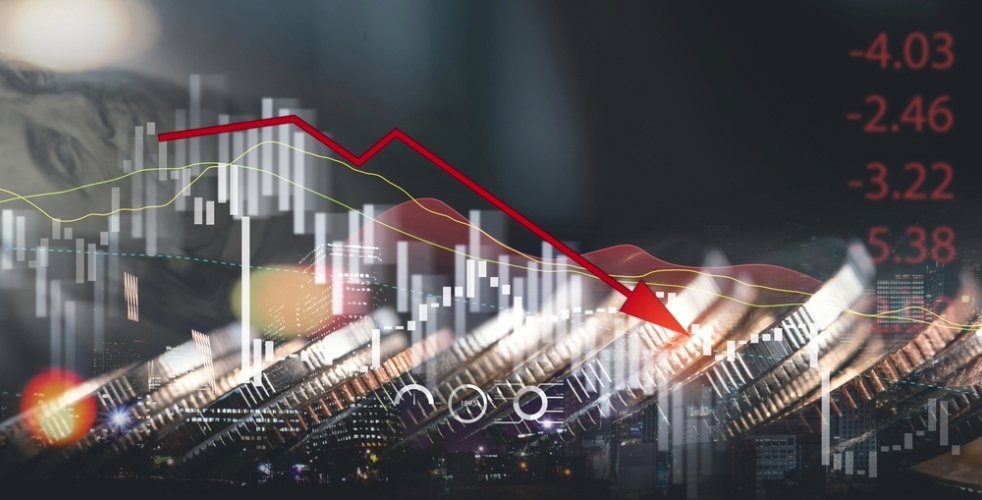
If you’re going to sail into retirement with a nice fat portfolio and big sacks of money strewn across your deck, then you’re going to have to deal with some ups and downs along the way. Financial markets are volatile by nature, and how you respond to these critical, anxiety-inducing periods can make the difference between a meager retirement, and a life of luxury.
Will you cut and run when the markets turn red? Or do you have the courage to stay the course and manage the risk – as well as yourself – in pursuit of your long-term objectives?
The goal of this article is to provide some strategies for managing your emotions during a market selloff. If you can learn to keep your head cool when panic prevails, you’ll have a significant advantage not just with investing, but also in life. This is, however, much easier said than done, so read on for some tips on how to develop your mental resilience.
Before we get into specific strategies, it’s important to point out that mental resilience is like a muscle. It gets weak and atrophies when not in use, and grows stronger when you exercise it. Studies show that inner toughness, determination and persistence aren’t innate qualities, but must be learned and refined over time. With that, let’s get started.
Don’t Look?
Some people will tell you that if you can’t stomach seeing the fluctuations in your accounts as markets ebb and flow, then just don’t look. While that might work for some people, there are a couple of reasons why this is actually a terrible idea. You don’t have to check your portfolio on a daily or even weekly basis, but opting to neglect it can have some devastating consequences.
The main reason why you should make it a point to continually monitor your investment accounts is because it’s your money, and your future. If something happens to it, it affects no one but you – and perhaps your family – but that’s a separate point. Even if you rely on outside help to determine your investment selections, how will you know if the strategy’s working? How will you know if and when something’s wrong?
In addition to just being a good custodian of your capital, the other reason you need to continually monitor your portfolio is to make sure you stay on track to reach your longer-term goals. Lavish retirements do not happen by accident, they are planned for and executed. You need to have a date and number in mind for retirement, and you need to know how much you must contribute each month, and what rate your portfolio must compound at, to hit those goals. (If you need help with this, see our Retirement Calculator).
So rather than choosing the path of least resistance (not looking), let’s instead examine a few ways we can build mental resilience and prepare ourselves for the next market event.
Manage Your Expectations
Without a doubt, the easiest way to make sure that you’re mentally prepared to handle the next round of market volatility is to know what to expect. Understanding the history of asset prices, and what’s considered “normal behavior” in the financial markets can go a long way in helping to ease one’s nerves during a meltdown.
In a prior post, we detailed a few key things to always remember about financial markets. One of the main takeaways is the notion that volatility is a normal and natural part of all markets. No asset ever rises or falls in a straight line… In fact, when you see that happening, it’s a good indication that some type of reversal is close at hand.
Rather than moving in only one direction, prices usually follow a “two steps forward, one step back” type of rhythm. Each advance is met by a period of sideways movement or “consolidation” as market participants adjust to the recent gains. From time to time, the market will reverse course and fall somewhere between 5-15%. These so called “corrections” are a natural phenomenon of bull markets, so it’s important to get used to them.
Also, never forget that market prices are primarily controlled through the buy and sell decisions of – yes – human beings. This means that markets are subject to the whims of mass psychology and the madness of crowds. That makes the situation volatile all by itself, but in the last decade a new bogey has emerged that can occasionally make things even worse.
This new development is the emergence of machine trading. These days, many firms utilize rules-based algorithms to automatically buy and sell securities at lighting speed. When these machines all end up on one side of a trade, the financial markets can move with devastating speed, either up or down. We may not like it, but this is the environment that we must operate in.
Have a Plan, and Stick to it
When we’re caught off guard by volatile market action, it’s tempting to want to do something about it. But even though we feel a strong need to react, more often than not, the best move is to do nothing, or rather – stick to the investment plan you’ve already devised.
All you have to do to realize this is ask yourself a simple question: Do you make better long-term decisions when you’re calm and collected, or in a mild state of panic?
Complex decisions, such as where and how to invest, must be made in advance, when you’re in an unencumbered state of mind. Just as battle plans are always drawn up in advance of battle, your investment strategy should be set prior to dealing with market volatility. And it should include how you will react when an inevitable selloff ensues.
In most cases, your investment approach will dictate riding through these natural market corrections. But keep in mind that not every downward move in the markets is a temporary blip. Roughly every 5-10 years our economy will go through a recession and stocks will lose a substantial amount of value. Holding stocks through periods like this is not a good idea, as they can often fall by more than 50%. So make sure your investment strategy includes some way of identifying and protecting your portfolio from these longer periods of sustained weakness.
By choosing to be proactive and planning for market events, rather than reacting to them, you’ll acquire a greater sense of confidence, and won’t be fazed when the inevitable correction arrives.
Focus on the Long Term
Are you currently in retirement, withdrawing funds from your investment accounts? If not, then chances are you’re a net buyer of stocks, through contributions to your 401(k), TSP, IRA or other accounts. If that’s the case, then I’m going to let you in on a little secret: You don’t want the stock market to do well … selloffs and market panics actually work in your favor.
Think about it, if you’re in the accumulation phase of your life, then you’re a continual buyer of stocks. And as you’ve probably heard, the way to make money investing is to buy low, and sell high. When the market goes up for extended periods of time, you’re purchasing stocks at inflated values. It may feel good to see your portfolio doing well, but over the long-run, lower market prices are actually much better for you.
The lower market prices are, the more shares you’re able to purchase each time you make contributions to your account. Over a lifetime of investing, this can really add up. So contrary to popular belief, if you’re a net buyer of stocks (just about everyone who’s not in retirement is) then you should be hoping and praying for the market to go down. This will set you up for much more spectacular gains down the road.
Now, of course, this only applies to those who are accumulating stocks. If you’re in retirement, and you’re taking distributions either by choice or because it’s required, then you do want market prices to be as high as possible. But even if that’s the case, don’t fret. If you’re following the standard guidelines of using a 3-4% annual withdrawal rate, then recognize that your portfolio will be liquidated over a 30-year period or longer.
Because you’re selling such a small portion of your portfolio each year, short-term fluctuations won’t have a huge impact on your overall retirement. Therefore, don’t concern yourself with what the markets are doing this week, or this month. Over the long-run, the markets will hold up just fine.
Accept the Lack of Control
The notion of control plays an important role in our lives. Generally speaking, we feel good about ourselves to the same degree in which we feel that we are in control of our lives. When we’re mentally and physically controlling what happens to us, it leads to a sense of calm and certainty. Uncontrolled change, however, can lead to anxiety, frustration and a general sense of unease.
When it comes to investing, some things are within our control, but many others are not. Deciding which type of investment strategy to follow in your accounts is well within your control, but how the markets behave on any given day or week is not. This means you need to be very careful about what you worry about.
During times when it feels like the markets are in free fall – and trust me, there will be many times like this – instead of dwelling on temporary changes in your account value, ask yourself if you’re using a trusted, proven, long-term strategy for managing your portfolio. If the answer is yes, then sit back and relax … you have no control over short-term fluctuations in the financial markets, so why worry about them?
On the other hand, if you’re choosing your investment allocations arbitrarily, relying on coworkers for advice, or think that a target-date fund is watching out for you, then you do have something to worry about, but it’s not short-term market action!
Conclusion
The Navy SEALs have a saying: “Get comfortable being uncomfortable.” Part of the key to achieving this is understanding which situations warrant an emotional reaction, and which don’t – in other words, what’s within your control, and what isn’t? You may not be able to control everything that comes your way, but you can absolutely control how you react to it. And in the end, that’s what really matters.

An innovative approach for eaming higher returns with less risk
Download Report (1.2M PDF)You don’t want to look back and know you could’ve done better.
See Pricing



